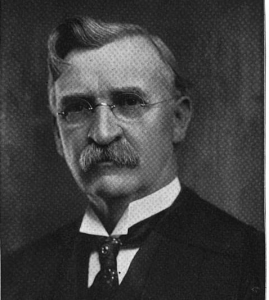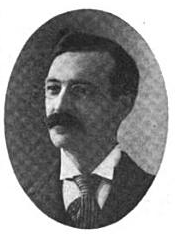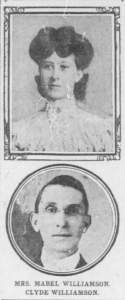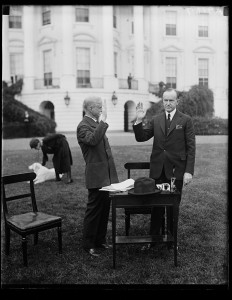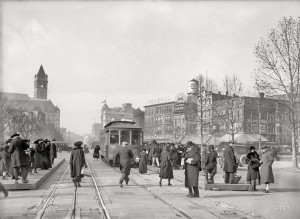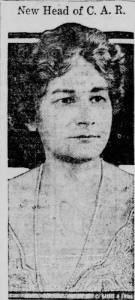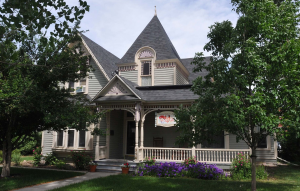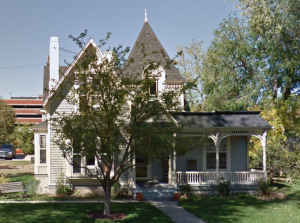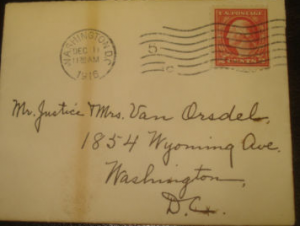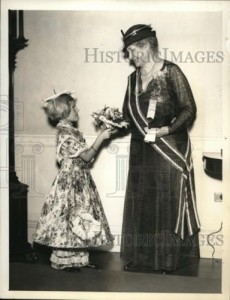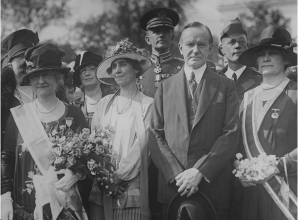Josiah Alexander van Orsdel
Josiah Alexander van Orsdel (1860-1937), was, like my wife, descended from Cornelius van Orsdel, a Dutchman who as a child came to Virginia shortly after 1760. Cornelius fought for the Americans during the Revolutionary war and received a grant in Pennsylvania, where Josiah was born. Josiah is my wife’s first cousin, four times removed. He spelled his name with one l, unlike his descendants who usually used two l‘s. We gave one of children van Orsdell as his third name; it seemed a shame to have a Dutch name die out. Van Orsdel means “of the valley of the bear.”
Josiah was born in New Bedford, Pennsylvania and went to Westminster College. He followed the advice to Go West and moved Nebraska to where he ran a mill. He was a county and practicing attorney in Laramie, Wyoming beginning in 1892; he was elected to the Wyoming State House of Representatives in 1894, and was appointed State attorney general 1898-1905. He was US attorney in Wyoming 1906-1907, Because of his legal work and his work for the Republican party, Teddy Roosevelt appointed him to the US Court of Appeals, where he served until his death.
Wyoming Attorney General
Josiah was the Attorney General of Wyoming from 1898 to 1905 and then became U. S. Attorney there.
Women’s Suffrage
The Western states were the first to give women the right to vote. They did this to counterbalance the large numbers of disorderly, violent young men who were attracted by the frontier. Van Orsdel explained:
Wyoming has had female suffrage ever since 1868, when it was first given a territorial government. When it became a State, the right of the sex to the franchise was incorporated into the constitution. From the earliest period of equal suffrage, with us, women have voted with the same degree of intelligence that the men have displayed, and now that the experimental stage has long since passed, the universal verdict is that the principle is not only correct, but that in its practical operation it has been a great success.
One special good feature is that it makes all the parties put up men for office whose records and private character are clean. It cannot be out pf the question to nominate and elect a candidate who notoriously was of bad or profligate habits, for the women would go to the polls and vote solidly against him.
Van Ordel would have been disappointed by the support that women voters gave to J. F. Kennedy and Bill Clinton; he apparently had not noticed the attraction of some women to the exciting bad boy.
Lynch Law
Perhaps van Orsdel hoped that women voters would help lessen the tendency of men to take the law into their own violent hands.
Crime-control partisans in Wyoming particularly scorned the appellate process, arguing that the state supreme court commonly reversed convictions and granted new trials to murderers and stays of execution to those who had received death sentences. Following a spate of lynchings in 1902 and 1903, the attorney general, J. A. van Orsdel, agreed that the law should be amended to hasten the appeals process in death penalty cases but noted that this was the responsibility of the legislature, not the scapegoated judiciary. Reviewing the courts’ recent record, Van Orsel also pointed out that popular perceptions of reversals in homicide cases were erroneous:
“Juries and trial courts have not been lax in the performance of their duties. In other words, conviction of murderers has been the popular thing in Wyoming for some time past. There has been no disposition on the part of the Supreme Court to reverse any of these convictions. The Supreme Court of Wyoming has never reversed a capital case since statehood, and only one during the territorial period.”
But the courts indeed were reluctant to execute people.
The Territory and State of Wyoming executed ten men between 1869 and 1911, all on homicide convictions. Long dry spells on the gallows twice coincided with spasms of lynching for homicide. The gallows was inactive from 1875 through 1993; lynchers killed four men on homicide charges between 1979 and 1884. The gallows was also dormant from 1895 through 1902; mobbers assassinated four persons accused of murder in 1902 and 1903.
Jim Gorman fell in love with his sister-in-law Maggie. The offended brother Tom drove Jim away. Jim came back and put a hatchet in his brother’s head in April 1902. Maggie was also arrested on suspicion of helping to plan the murder. She claimed she had nothing to do with it; Jim claimed self-defense. Edward Enterline was his attorney.
The jury found Jim guilty of manslaughter, Jim Gorman requested a new trial. He was found guilty of murder in the first degree and was sentenced to death.
Joseph Walters had fallen in love with a widow. When she refused him he shot and killed her and shot himself, but he survived. He was tried for murder, found guilty, and sentenced to hang. Enterline represented him and appealed the verdict.
Enterline wrote Josiah van Orsdel, the attorney general, in July, 1902 about the case:
I am pleased to stipulate with you for further time. My client is not anxious to be hanged during this hot weather.
The Wyoming Supreme Court took up the case on April 14, 1903.
Jim Gorman and Joseph Walters cellmates in the Big Horn County Jail in Basin, Wyoming. Gorman had been scheduled to be hanged June 16, 1903. The citizens of the area were indignant that he was not hanged, and started muttering about Judge Lynch.
For their protection, Sheriff Fenton took Gorman and Walters to a canyon to escape the mob. Gorman bolted and escaped. But there was no cover, and he was captured. Gorman and Walters were back in the jail, and the citizens were in the bars.
The sheriff was in another town with a posse to arrest a criminal when he was confronted by a masked mob. He wired for the militia.
On July 20, 1903 the only officials at the Big Horn County jail were Earl Price, deputy sheriff, and George Mead, the jailer. The mob attacked the jail, shooting through the windows , wounding Mead and killing Price. They battered down the door of the jail, but could not get the cell door open to hang the two killers. They shot Gorman and Walters through the jail door, killing them. The Chief Justice on the Wyoming Supreme Court was in town that night for a Freemasonic meeting, and was asked to try to calm the mob. He decided it would not avail.
No one was ever convicted.

Court of Appeals
Because of his extensive legal work and his support of the Republican Party, Teddy Roosevelt appointed van Orsdel to the Court of Appeals.
Van Orsdel’s decisions on the Court of Appeals show that he was a strict constructionist of the Constitution, and did not favor one interest over another. He made some important and some amusing decisions.
The Lie Detector and Admissible Evidence
Josiah’s best known decision was in the case of Frye It is a complicated case because there is an inaccurate legal legend surrounding it. Jim Fisher separated myth from reality in his essay The Polygraph and the Frye Case.Here is an analysis of van Orsdel’s decision:
In what some consider a maddeningly terse two-page opinion, Associate Justice Van Orsdel showed his understanding of the theory behind the science. He abstracted that lying causes a rise in blood pressure, which corresponds to the mental struggle between fear and control of fear. Whereas truth flows without conflict, deception requires effort, manifest in a rise in systolic pressure distinguished from the normal fear of the test situation. Acknowledging the defense attorneys’ argument that expert testimony is required when the subject matter is beyond ordinary experience, the court took a different approach to experts’ use of such technology: Somewhere in this twilight zone [between experimental and demonstrable stages of discovery] the evidential force of the principle must be recognized, and while courts will go a long way in admitting expert testimony deduced from a well-recognized scientific principle or discovery, the thing from which the deduction is made must be sufficiently established to have gained general acceptance in the particular field in which it belongs [Ref. 14, p 1014]. Thus, the exclusion of Marston’s lie detector was affirmed. The court reasoned that, since the apparatus had not yet achieved standing, the testimony from which it was derived must be excluded.
Free Speech, Boycotts, and Picketing
The second important case concerned the AFL and Samuel Gompers. The union was in a dispute with Buck’s Stove and Range Stove Company. The AFL published the name of the company in its We Do Not Patronize column, thereby engaging in a boycott. The lower court held this was an illegal secondary boycott, and sentenced and fined Gompers and others for contempt of court, and gave an injunction against even mentioning the boycott or the injunction against it.
On November 2, 1909, the Court of Appeals partially upheld and partially modified the lower courts’ decisions.
Van Orsdel’s concurring decision focused on the question of free speech.
Again, we do not assume that it will be contended that a citizen has not perfect freedom to deal with whom he pleases, and withhold his patronage for any reason that he may deem proper, whether the reason be one originating in his own conscience, or through the advice of a neighbor, or through the reading of an article in the paper. Neither would it be unlawful for such citizen to advise another not to deal with a person with whom he has concluded –not to continue his patronage. If this advice may extend to one it may extend to a hundred; and the thing done will not be actionable so long as it is an expression of honest opinion and not slanderous, however much the intercourse between this citizen and his neighbor may operate to injure the person against whom the advice is directed.
No one doubts. I think, the right of the members of the American Federation of Labor to refuse to patronize employers whom it regards as unfair to labor. It may procure and keep a list of such employers not only for the use of its members, but as notice to their friends that the employers whose name appear therein are regarded as unfair.
I conceive it to be the privilege of one man, or a number of men, to individually conclude not to patronize a certain person or corporation. It is also the right of these men to agree together, and to advise others, not to extend patronage. That advice may be given by direct communication or through the medium of the press, so long as it is not in the nature of coercion or a threat.
As Samuel Gompers said, it was hard to see why van Orsdel ruled against the AFL members even in part. The Railway Clerk agreed with Gompers, but thought that progress had been made.
Another issue involving free speech was brought to the court when suffragettes were arrested for picketing the White House. The police arrested and jailed 20 picketers from the National Women’s Party who had unfurled banners demanding the vote for women.
The Justices, including van Orsdel, questioned the D.C. corporation counsel
whether he would arrest men for carrying a banner bearing some of “Billy” Sunday’s phrases.
Van Orsdel decided for the picketers and declared the arrests were illegal. This also established the right to peaceful picketing in labor disputes in the District of Columbia.
The Case of the Canadian Bride
Clyde Williamson, bookkeeper with Potomac Electric, who lived with his mother, wanted an annulment of his marriage with his wife Mabel. The lower court denied his request, and he appealed
The facts were:
The Williamsons became acquainted through a matrimonial agency paper, the advertisement being inserted by the young woman, a waitress in a Canadian hotel. A correspondence was conducted with ardor, 100 letters being exchanged between April and November 1906.
The engagement of the couple followed, and Williamson urged his bride-to-be to come to Washington from her home, a village in Canada. For the journey he sent her $21. She failed to appear at the appointed time, but wrote to Williamson, explaining that she had appropriated some of the money to “assist her sister in a runaway from her father’s house.”
Twenty dollars more was sent, and she made the journey to Washington. Within two hours after her arrival here they were married.
This was in April. The relationship soured. Williamson claimed that in a short time
He began to learn what Socrates enjoyed with Xantippe.
They separated by June. She then sued him for maintenance. He then asked for an annulment of the marriage on the grounds of fraud, because she had “represented herself as having a loving and congenial disposition.”
She claimed
I did not marry Clyde’s family. I married Clyde. My unfortunate temperamental qualities that so pained and shocked him after he had practically married me by mail are entirely based on my alleged mistreatment of his mother.
She didn’t want a divorce because her relations in Canada thought she was happily married, and she didn’t want to hear the “I told you so’s”
Van Orsdel denied the annulment and said:
It appears from his story that she does not possess that mild temperament which he expected to find in a helpmate selected from the bargain counter of a matrimonial bureau. However, it is well settled that mere misrepresentations as to social position, rank, fortune, manners, and disposition furnish no grounds for declaring a marriage contract void. Such misrepresentations are tolerated on the grounds of public policy. The law wisely requires that persons who act on representations of this character shall bear the consequences and I can find no reason for the abrupt termination on this romantic venture.
An Administrator of Oaths
Calvin Coolidge encouraged everyone to vote. Here we have a picture of Coolidge swearing to van Orsdel that his employment precludes his return to his home district to vote and that therefore he is voting by absentee ballot.
Streetcars
Josiah did not favor business interests over the ordinary citizen. A rider was injured when he fell of the platform of a streetcar as it turned a corner and he sued the company. The streetcar company argued that it had posted a sign warning not to stand on the platform. Josiah decided against the company on these grounds:
The street railway cannot deliberately permit and create a custom of hauling passengers on the platforms of the cars and escape liability for accidents.
Neither can they escape the obligation imposed by the custom by posting a notice warning passengers: It is dangerous to ride on the platform. The custom this established is equivalent to an invitation to passengers to occupy and ride upon the platforms, and the mere posting of such a notice will not relieve the company from liability.
It is the custom not only to permit passengers to ride upon the platforms but to permit cars to be so crowded as to compel passengers to ride there.
It also sounds like it was written by someone who rode the Washington, D. C. streetcars.
Minimum Wage
The Children’s Hospital of the District of Columbia vs. Jesse Adkins et al.
Congress passed a law that women must be paid a minimum wage on the grounds that a sufficient salary would protect them from temptations to immorality. The Hospital maintained that it could not afford to pay the wage, and that Congress had no authority to set wages. The Court of Appeals upheld the law, but Josiah dissented on two grounds:
One: if women were equal to men (and he was a firm supporter of the vote for women) why were they singled out for protection?
Two: A minimum wage interferes with freedom of contract; if the government can establish a minimum wage, it can establish a maximum wage.
No greater calamity could befall the wage earners of the country than to have the legislative power to fix wages upheld. Take from the citizen the right to freely contract and sell his labor for the highest wage which his individual skill and efficiency will command, and the laborer would be reduced to an automaton – a mere creature of the state.
It will logically, if persisted in, end in social disorder and revolution.
Welfare Act of 1935
The Welfare Act of 1935 provided for the resettlement of people in new towns, such as Greenbelt. Franklin Township, where one of the new towns was to be located, sued to stop the construction. The case was FRANKLIN TP. IN SOMERSET COUNTY, N.J., et al. v. TUGWELL, Administrator Resettlement Administration, et al.
Van Orsdel ruled against the government on these rounds:
- The Act was an unconstitutional delegation of legislative power.
- It is axiomatic in constitutional law that Congress cannot delegate the law-making power with which it is vested by the Constitution.
- The Constitution did not grant the federal government power over housing.
The Constitution will likewise be scanned in vain for a power conferred upon the federal government to regulate “housing” or to “resettle” population. Those words are not explicit there, nor do we think they are implicit in any power which that instrument confers on Congress; and, unless the power exists, any effort by Congress to assert it at once transcends the scope and limitations of section 8 of article 1 and violates the Tenth Amendment.
The Social Life of the van Orsdels
Josiah married Kate Barnum (1868-1951) of Beatrice, Nebraska, on July 28, 1891, in Blue Springs, Nebraska.
314 East 21st St, Cheyenne
In the spring of 1899 Josiah bought the house at 314 East 21st Street, Cheyenne, Wyoming, and lived there until 1906.
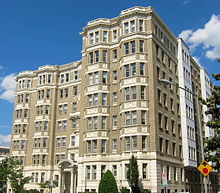 The Norwood, 1868 Columbia Road NW
The Norwood, 1868 Columbia Road NW
When Josiah moved to Washington he took an apartment at 1868 Columbia Rd NW, in Adams Morgan.
1854 Wyoming Ave., Washington, D.C.
In 1912 he moved to this house on Wyoming Ave, with eighteen rooms and four baths.
1306 Washington St, Beatrice
The van Orsdels kept a house in Beatrice, Nebraska, and returned to it most summers.
The Ball Player
May 21, 1910 was a quiet day in court. The Washington Bar Association et al. boarded a ship and went on a picnic.
Following breakfast, which was served immediately upon landing, the legal lights engaged in athletic games. There was the usual ball game, and it lasted the usual length of time, some five or six innings, which required one hour and thirty minutes to play. Sides were chosen from the ‘fat’ and ‘lean’ members of the fraternity, and when the game came to a halt to allow the party to partake of the feast of shad the figures rested 14 to 13 in favor of the lean aggregation.
It was some game. The figures multiplied rapidly, and the day was so warm that new faces appeared on both teams every inning. There was one who stuck it out, though. He was the unfortunate umpire. James A. Toomey essayed the role of arbitrator, and got away with it. One of the features of this interesting contest was a home run by Justice Van Orsdel and at a time when the bases were crowded to capacity. It was the hit that broke up the game.
SAR, DAR, CAR
Josiah was active in the Sons of the American Revolution: President of the D.C. Society from 1924 to 1925, National Vice President General from 1925 to 1927, and President General from 1930 to 1931 and again from 1931 to 1932, filling the vacancy caused by the death of his successor.
In 1935 he explained his view of the Constitution to the SAR:
The primary object of government in this country was not to govern the citizen, but to protect him from arbitrary power, and above all to protect the minority from the tyranny of the majority.
His wife Kate was active in the Children of the American Revolution.
Kate With a child of the American Revolution
Kate with the Coolidges
Josiah died on August 7, 1937 at his niece’s home, The Cabin in the Pines, in Great Barrington, Massachusetts; Roosevelt filled the vacancy with a judge more sympathetic to the New Deal.
